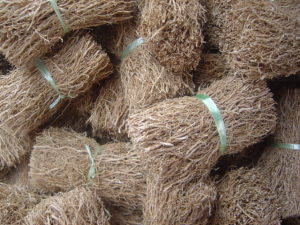Chrysopogon zizanioides, commonly known as vetiver (derived from the Tamil: வெட்டிவேர் veṭṭivēr) is a perennial bunchgrass of the Poaceae family, native to India. In western and northern India, it is popularly known as khus.
Contents
Uses
Vetiver has been used in traditional medicine in South Asia (India, Pakistan, Sri Lanka), Southeast Asia(Malaysia, Indonesia, Thailand), and West Africa.
Old Tamil literature mentions the use of vetiver for medical purposes.
Benefits
The therapeutic properties of vetiver oil are antiseptic, aphrodisiac, cicatrisant, nervine, sedative, tonic, sedative and vulnerary.
- Burners and vaporizers
- In vapor therapy, vetiver oil can be used for nervous complaints, dispelling hysteria, anger and irritability and also to relieve insomnia.
- Blended massage oil or in the bath
- In blended massage oil or diluted in the bath, vetiver oil can help with mental and physical exhaustion, nervous complaints, rheumatism and arthritic pain, insomnia as well as balancing the hormonal system and have a healing effect on the skin.
- Cream or lotion
- In a cream or lotion, it can be used to moisturize and nourish the skin and is specifically beneficial for dry, irritated and dehydrated skin. It is also helpful in reducing wrinkles and stretch marks and to improve the tone of slack skin, as well as helping wounds to heal.
Cautions
It is considered a safe oil and is non-toxic, non-irritant and non-sensitizing.
Interactions
None are recorded.
Other names
vetiver
References
Wikipedia, https://en.wikipedia.org/wiki/Chrysopogon_zizanioides#Medicinal_use
Essentialoils, http://www.essentialoils.co.za/essential-oils/vetiver.htm#Precautions

